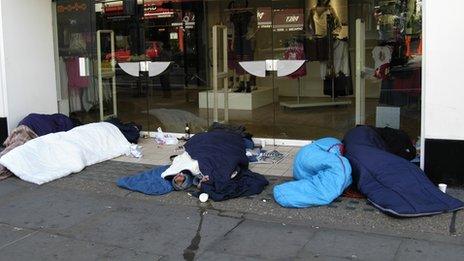Scottish young homeless 'subclass' warning
- Published

Homeless young people are being failed by a lack of support in overcoming inadequate life skills, a Scottish parliament committee has found.
A report by Holyrood's Equal Opportunities Committee said the problems were compounded by substandard accommodation and isolation.
It highlighted the challenges facing young people experiencing family breakdown, and those leaving care.
One witness warned about a "subclass" of young homeless.
Committee Convener Mary Fee said: "While we recognise that the Scottish government and local authorities are working hard to prevent youth homelessness, we were very troubled to hear from 16-year-olds leaving care with a real lack of essential life skills such as budgeting being put into utterly unacceptable, substandard accommodation and left isolated in an unsupported tenancy at the age of 16.
"The Scottish government must ensure that more consistent preventative work is undertaken and life skills taught in schools, that minimum statutory standards for accommodation are met and that our most vulnerable young people are supported at such a crucial time in their lives."
The report outlines evidence given to the committee by Dr Paul Monaghan of the Highland Homeless Trust.
Dr Monaghan said that young homeless people possess "typically inadequate social skills and inadequate awareness of social norms."
He added: "We... are in danger of creating a subclass of individuals who do not have the social skills to move forward."
Yvette Hutcheson, 25, was one of the young people who gave evidence to the committee.
She found herself homeless at 19 following a family breakdown and said she felt lost.
"It was manic," she said.
"I don't know how else to describe it.
"It was a constant stress with not knowing where you were going to be sleeping that night."
After almost three years of what she calls "sofa-surfing", she was offered temporary accommodation at Quarriers James Shield's centre in Glasgow.
Now in a flat of her own, she wishes that she had been offered help sooner.
"You shouldn't have to get to such a low point before people say: 'Right OK, you're eligible now - we can help out.'
"I think when you first say there's a problem that's when action should be taken."
Mediation and respite
The committee calls on the Scottish government to report back on a number of issues:
- The great concern felt by the committee at some local authorities' routine handling of 16-year-old care leavers via the homelessness route.
- The need to ensure community care grants (CCGs), which are available to help people on low incomes move out of residential care into a tenancy, are in place on the day the young person gets the keys to the tenancy rather than weeks and months later.
- A stock-check of every local authority's strategy to prevent youth homelessness should be carried out to identify the effectiveness of each and identify poor performers.
The committee recommends that tools such as mediation, respite and the role of schools could all be used as a means of preventing homelessness.
A spokesman for the Scottish government said: "Tackling homelessness amongst people of all ages is a key priority for the Scottish government.
"Being left without a home is a massive blow at any age and we are well aware of the devastating effect it can have on young people just starting out in life."
- Published26 June 2012
- Published23 February 2012
- Published21 December 2011